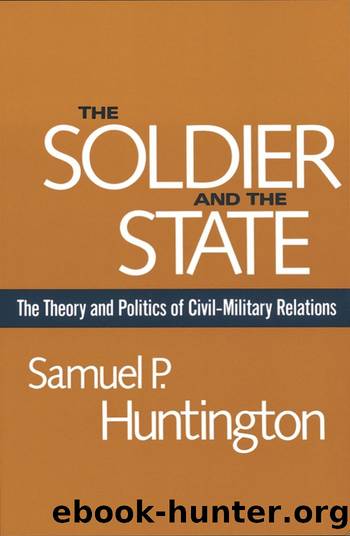The Soldier and the State (Belknap Press S) by Samuel P. Huntington

Author:Samuel P. Huntington [Huntington, Samuel P.]
Language: eng
Format: azw3
Publisher: Harvard University Press
Published: 1981-09-14T16:00:00+00:00
I am enduring, not living [he wrote one friend]; and have the painful consciousness that I am expending much labor in doing what I have indifferently, while debarred from doing what I have shown particular capacity for. It is not a pleasant feeling â especially when accompanied with the knowledge that the headstrong folly of my youth started me in a profession which, to say the least, was not the one for which I have the best endowments . . . I have become exceedingly interested in professional literary work, and have now a fair promise of success in it.
Given this attitude, it is not surprising that his superior officer declared in a fitness report that Mahanâs âinterests are entirely outside the Service for which, I am satisfied, he cares but little and is therefore not a good officer.â4 After this last tour of sea duty, Mahan did retire in 1896 and thereafter only served on active duty during the Spanish-American War and on a few other temporary occasions.
Mahanâs theories thus reflected the civilian intellectual currents of his time as well as the developing naval professional outlook. The change in his activities from professional work to popular writing coincided with the change in his thinking from professional realism to the defense of expansion and violence. To support his position, he called in Christian doctrine, Social Darwinism, utilitarianism, and nationalism. He elaborated upon the civilian doctrines of manifest destiny. Mahan was truly âa child of his age, an age of budding imperialism.â5 In his magazine articles, he consciously appealed to the sentiments for expansion stirring in the American populace. As he himself said, his writings traced ânot my development, but the progress of national awakening from 1890 to 1897.â His function was that of popularizer and articulator of the political sentiments of the day. Mahanâs doctrines were in many respects more widely accepted by the American public than by the American Navy. His immediate influence upon his fellow officers did not equal that of the more professionally inclined Luce and Sims.6 Separated from his profession, Mahan rode the swelling tide of imperialist sentiment in the 1890âs. He was acclaimed at home and honored abroad. His books were best sellers, his articles widely read and quoted. He was the premier spokesman of the new doctrines, the confidant and adviser to Lodge, Roosevelt, and the other Neo-Hamiltonian political leaders of the day. In shifting his base from the naval profession to public opinion, however, he had gained temporary strength at the expense of permanent support. Inevitably, after the turn of the century, the reaction against Neo-Hamiltonianism and imperialism set in. Popular opinion swung back toward liberalism, isolation, pacifism, and indifference to preparedness and the responsibilities of national greatness. His books no longer commanded the audience which they once did. Mahan vigorously criticized The Great Illusion, but it was Norman Angell rather than he who was now the best seller. In his autobiography published in 1907, the sense of separation from the public was as manifest as the sense of separation from the profession.
Download
This site does not store any files on its server. We only index and link to content provided by other sites. Please contact the content providers to delete copyright contents if any and email us, we'll remove relevant links or contents immediately.
| Africa | Americas |
| Arctic & Antarctica | Asia |
| Australia & Oceania | Europe |
| Middle East | Russia |
| United States | World |
| Ancient Civilizations | Military |
| Historical Study & Educational Resources |
The Bomber Mafia by Malcolm Gladwell(1180)
Submerged Prehistory by Benjamin Jonathan; & Clive Bonsall & Catriona Pickard & Anders Fischer(1162)
Facing the Mountain by Daniel James Brown(1131)
The Dawn of Everything by David Graeber & David Wengrow(1103)
The Way of Fire and Ice: The Living Tradition of Norse Paganism by Ryan Smith(1032)
Wandering in Strange Lands by Morgan Jerkins(1014)
Tip Top by Bill James(1002)
Driving While Brown: Sheriff Joe Arpaio Versus the Latino Resistance by Terry Greene Sterling & Jude Joffe-Block(1001)
Evil Geniuses: The Unmaking of America: A Recent History by Kurt Andersen(999)
Red Roulette : An Insider's Story of Wealth, Power, Corruption, and Vengeance in Today's China (9781982156176) by Shum Desmond(997)
F*cking History by The Captain(966)
It Was All a Lie by Stuart Stevens;(940)
White House Inc. by Dan Alexander(904)
Evil Geniuses by Kurt Andersen(901)
Treasure Islands: Tax Havens and the Men who Stole the World by Nicholas Shaxson(879)
American Dreams by Unknown(857)
American Kompromat by Craig Unger(847)
The Fifteen Biggest Lies about the Economy: And Everything Else the Right Doesn't Want You to Know about Taxes, Jobs, and Corporate America by Joshua Holland(816)
The First Conspiracy by Brad Meltzer & Josh Mensch(811)
